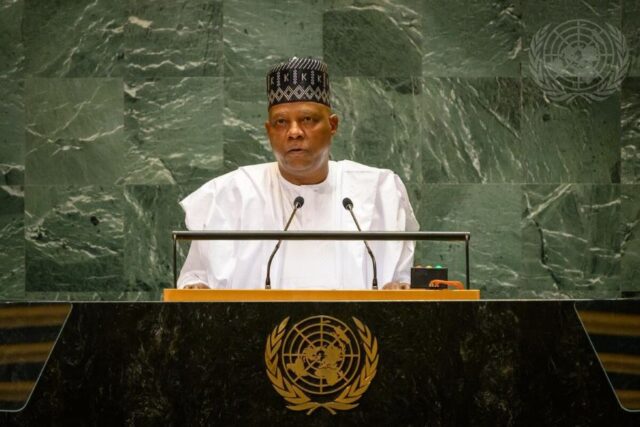
…The Vice President’s speech at the Session touched on urgent global challenges, and noted Nigeria’s recently celebrated a quarter century of unbroken democratic rule
WED SEPT 25 2024-theGBJournal| During the general debate of the 79th Session of the United Nations General Assembly (UNGA 2024) in New York, Vice President KASHIM SHETTIMA argued that there is an urgent need to promote fair and inclusive global tax regimes and work towards a UN framework convention on tax cooperation.
The Vice President noted that Nigeria helped introduce the resolution on “Promotion of inclusive and effective international tax cooperation at the UN.
”We acknowledge the progress made in the adoption of the terms of reference of the UN Framework Convention on Tax Cooperation. We should deepen this initiative and work towards a UN Framework Convention on Tax Cooperation.
Similarly, we must ensure that any reform of the international financial system includes comprehensive debt relief measures, to enable sustainable financing for development.
Countries of the global South cannot make meaningful economic progress without special concessions and a review of their current debt burden.
My government pays due regard to the imperatives of creating a conducive national environment for investment and the ease of doing business. Last year, I signed four Executive Orders to curb double taxation. I also established the Presidential Taskforce on Review of Fiscal Policy and Tax Reform. These measures are geared towards not only boosting investor confidence in Nigeria, but also to ensure investors make reasonable profit from their investments,” Shettima told numerous Heads of State and Business leaders attending the General Assembly.
The Vice President also noted that countries of the Global South cannot make meaningful economic progress without special concessions and a review of their current debt burden.
Meanwhile, as the world transitions into the fourth industrial revolution, he said the Federal Government believes that natural gas remains central to the search for solutions to Africa’s energy challenges.
The Vice President’s speech at the Session touched on urgent global challenges, and noted Nigeria’s recently celebrated a quarter century of unbroken democratic rule.
”We are no less proud of this achievement than the fact that during the last two decades, a sustained process of democratisation has swept over Africa,” he said.
Vice President Shettima harped on the return of unconstitutional changes of Government and forceful military takeovers in some countries of the Sahel which he said underscored the fragility of democracy when it is not backed by economic development and sustained peace and security.
”It is this fragility, rather than the milestones that democratic governance has achieved in Africa, that should matter most in our deliberations at this and other High-Level Segments of the 79th Session of the General Assembly. While we abhor all forceful changes of government, we can also recognise the impatience in cities and villages at the sometimes slow and grinding turn of the wheel of democracy.
It is the duty of the international community to bring back confidence in democratic rule, as “we need the substance of democracy, not just the form”, he said.
He warned that violent extremism remains an existential threat to both national and international peace, security and development, pointing to the High-Level African Counter-Terrorism Meeting hosted by Nigeria in April 2024 and
“The Abuja Declaration” — a promise to provide solutions to the challenges presented by terrorists and insurgents. “Conflict prevention is the main reason why the UN exists,” he stressed, and addressing the root causes of conflicts is often the first step towards providing long-term solutions.
Turning to “the heart-wrenching situation in Gaza and other Palestinian territories,” he affirmed that the Palestinian people deserve their independence, requiring the two-State solution. He reaffirmed commitment to supporting UN peacekeeping operations, recognizing the need for Africa to build strong and professional armies.
Consequently, he reiterated the call for international support to operationalize the African Standby Force. Welcoming the change in tone on Security Council reform, he stressed: “Our continent deserves a place in the permanent members category.” As most developing countries are significantly behind in the achievement of the SDGs, he expected that the Pact for the Future will reposition economies and translate into concrete measures — particularly significant in his region and the Sahel, where human development indices are low and depressing.
Reiterating the call for reform of international financial architecture, he emphasized that proceeds of corruption and illicit financial flows constitute a huge chunk of resources needed for sustainable development. The recovery and return of such funds to States of origin is a fundamental principle of the United Nations Convention against Corruption.
On climate action, it is Nigeria’s expectation that the upcoming twenty-ninth session of the Conference of the Parties to the United Nations Framework Convention on Climate Change (COP29) in Azerbaijan will provide developing countries — especially African countries — access to loss and damage funds, including the $100 billion pledged by developed countries.
With the evolution of artificial intelligence, the UN should work towards eliminating barriers to digital economy in Africa, such as high costs of Internet services and intellectual property rights.
Nigeria’s experience, he noted is that “new technologies, when not properly regulated, can facilitate organized crime, violent extremism and human trafficking.
On migration, he emphasized that Nigeria is a country of origin, transit and destination, reiterating support for the Global Compact for Safe, Orderly and Regular Migration.
X-@theGBJournal|Facebook-the Government and Business Journal|email:gbj@govbusinessjournal.com|govandbusinessj@gmail.com









